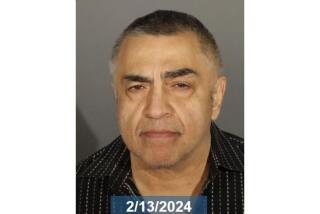Lawyer Gave Gun to Spiro for Protection : Crime: Wife and three children of Rancho Santa Fe resident were shot to death in their home before his body was found in a desert canyon.
- Share via
A San Diego attorney disclosed Thursday that he loaned a .38-caliber handgun to Ian Stuart Spiro two weeks before the shadowy British native’s wife and three children were found shot to death in their luxury Rancho Santa Fe rental home early this month.
Attorney James W. Street said that Spiro, whom he described as a client and personal friend, told him last month that he had received a series of telephone threats and then asked Street if he owned a weapon.
“My flippant response was, ‘Doesn’t everyone in Southern California have a gun?’ ” Street said in an interview in his downtown office. “And he (Spiro) said, ‘Can I borrow it?’
“I’m not sure I gave it too much second thought and I said sure. I mean, you know, if it would have made him feel better and more secure about the state that he seemed to be in.”
San Diego County Sheriff’s Sgt. Glenn Revell said Thursday he believed the weapon used in the killings was a handgun but did not know its make or caliber.
Spiro, 46, who has been linked by family, friends and British press reports to the CIA and British intelligence services, was himself found dead Nov. 8 inside his Ford Explorer in a canyon in Anza-Borrego Desert State Park.
Authorities, who have not yet found the weapon used to kill Spiro’s family, say that Spiro died of cyanide poisoning.
Homicide investigators have identified Spiro as a suspect in the mysterious killings of his wife Gail, 40, and their children--Sara, 16; Dina, 10, and Adam, 14. But this week, the Sheriff’s Department announced that the FBI has also been called in to help investigate rumors, promulgated primarily in British press reports, that the family was slain by international terrorists.
Those reports allege that Spiro, who described himself as an international commodities broker, was involved with Oliver North and Anglican Church envoy Terry Waite in seeking the release of hostages held in Lebanon by Muslim fundamentalist groups.
Street said that Spiro told him last month that he began receiving telephone threats after an alleged meeting with Hollywood producers concerning the possibility of a feature film based on his role in the hostage affair.
“He appeared to be quite concerned about his personal safety,” Street said. “I felt sorry for the guy, to tell you the truth.”
That’s why, Street said, he handed over to Spiro an old .38-caliber Smith & Wesson revolver Oct. 22 in the parking lot of the Jolly Roger restaurant off Interstate 5 in Solana Beach. Street said that the weapon, which had no silencer and discharged extremely loudly, was never returned.
Street said he informed authorities about the weapon shortly after the Spiro family was found dead in separate bedrooms of their four-bedroom rental home Nov. 5.
Street, a personal injury attorney, said he had become friendly with Spiro after the British native contacted him on a legal matter.
Several times during the last few months, Street and his wife socialized with the Spiros, whom he described as an engaging, tight-knit couple.
Street said that Spiro occasionally talked about his business experiences in the Middle East and once showed him a copy of a 1991 book by BBC correspondent Gavin Hewitt titled “Terry Waite & Ollie North: The Untold Story of the Kidnaping and the Release.”
The book says that Waite was introduced to a shadowy figure named “Spiro” by North and that “Spiro” helped Waite contact the Shiite Muslims who held American and British hostages.
Spiro’s brother-in-law, Ken Quarton, has told reporters that Spiro was worried in the weeks before his death about his name appearing in a book about the Lebanese hostage crisis.
But Street, who at first paid little attention to Spiro’s Lebanese experiences, said the British native “didn’t seem worried” about the references in Hewitt’s book.
Spiro, according to Street and other associates, appeared to have financial problems in the last few months of his life. But then, in October, Street said Spiro told him that he had been invited to Los Angeles to discuss making a film concerning his Middle East exploits.
“He had the look on his face like it was big money.”
Street said that Spiro never told him the names of the producers interested in his story. But he said that Spiro appeared dispirited when he returned without a firm movie deal.
The alleged threatening calls began shortly afterward, Street said.
Times staff writer Mark Platte and free-lancer Katharine B. Lowrie contributed to this report.
More to Read
Sign up for Essential California
The most important California stories and recommendations in your inbox every morning.
You may occasionally receive promotional content from the Los Angeles Times.










